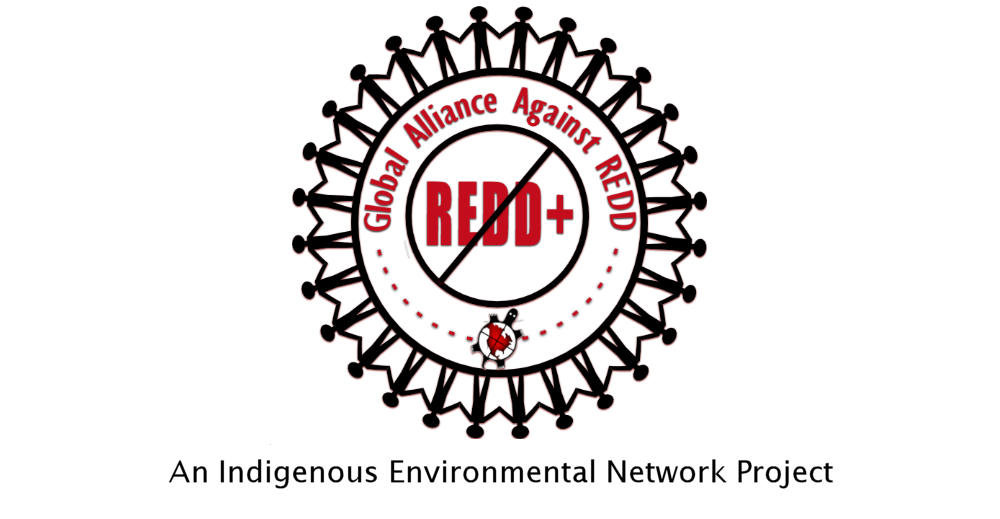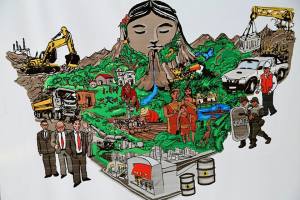 Yesterday, activists in Durban, South Africa launched the Durban Declaration on REDD. The Declaration opposes REDD, and rejects the “commodification, privatisation and plunder of Nature”.
Yesterday, activists in Durban, South Africa launched the Durban Declaration on REDD. The Declaration opposes REDD, and rejects the “commodification, privatisation and plunder of Nature”.
The Declaration was launched at an event organised under the Civil Society Alternative Programme, which runs parallel to the World Forestry Congress, also taking place this week in Durban.
Renowned environmental and social activist Nnimmo Bassey, co-coordinator of the No REDD in Africa Network, explained why he opposes REDD:
“All forms of REDD amount to two things: licensing polluters to keep polluting and grabbing lands and other resources from forest and peasant communities. REDD+ started as land grab, in Africa it is becoming a continent grab and if not checked it will turn into a planet grab.”
On the panel with Bassey was Anabela Lemos of Justiça Ambiental – Friends of the Earth Mozambique. She said that,
“Both the World Forestry Congress and the United Nations want to use REDD to grab Africa as a sponge for Northern industrialized countries’ pollution, instead of cutting emissions at source. Mozambique is already struggling with land-grabbing and human rights violations, REDD is going to exacerbate those problems and create more poverty. Already a third of Mozambique has been targeted for REDD.”

The Durban Declaration on REDD
September 2015
We, local communities, peasants movements, Indigenous Peoples and civil society organizations from Africa and all over the world, call upon the United Nations, the World Forestry Congress, the Food and Agriculture Organization (FAO), the World Bank and states to reject top-down forms of development, including false solutions to climate change and forest and biodiversity conservation that only serve the dominant market economy.
We are united to oppose and reject the commodification, privatisation and plunder of Nature, which include REDD+[1] and other market-based mechanisms including biodiversity and conservation offsets that put profit above the wellbeing of humanity and the planet.
These mechanisms include the “financialization of nature,” which commodifies, separates and quantifies the Earth’s cycles and functions of carbon, water, forest, fauna and biodiversity – turning them into “units” to be sold in financial and speculative markets. However, Mother Earth is the source of Life, which needs to be protected, not a resource to be exploited and commodified as a ‘natural capital.’
REDD+ is also the pillar of the Green Economy. REDD+ is being misleadingly billed as saving the world’s forests and climate and is the anticipated main outcome of the UN’s Paris Accord on climate change in December 2015. In addition, REDD+ is a false solution to climate change that is already including forests, plantations and agriculture in the carbon Reports show that deforestation and the related emissions continue, and that REDD+, instead of reducing them, is harming and vilifying forest-dependent communities and those who produce the majority of the world’s food – small scale farmers. Furthermore,
- REDD+ promotes monoculture tree plantations and genetically modified trees
- REDD+ increases land grabs and human rights violations
- REDD+ restricts access to forests, threatening livelihoods and cultural practices
- REDD+ causes violence against peasants, Indigenous Peoples, women and forest-dwelling communities
- REDD+ is combined with other offsets including payment for environmental services (PES)
- REDD+ imposes market driven neo-liberalism on forests, which undermines and monetizes community conservation and social/cultural processes and creates inequalities
- REDD+ projects tend to force subsistence communities into the cash economy and exploitative wage-labor
REDD+ hinders and prevents much needed policies that support endogenous, bio-cultural approaches to biodiversity conservation and restoration.
Therefore, we join with the No REDD in Africa Network and the Global Alliance against REDD to demand that governments, the United Nations and financial institutions stop the disastrous REDD+ experiment and finally start addressing the underlying causes of forest loss and climate change!
Put forward by the No REDD in Africa Network (NRAN) and the Global Alliance Against REDD, with endorsement and support by the following. To be presented to the World Forestry Congress 2015, the UNFCCC COP21 and beyond:
No REDD in Africa Network
Global Alliance Against REDD
Indigenous Environmental Network
JA!/Justica Ambiental – Friends of the Earth Mozambique
All India Forum of Forest Movements/India
CENSAT Agua Viva – Friends of the Earth Colombia
Womin (Womens on Mining)
Foundation Help/Tanzania
Centre from Civil Society/University of KwaZulu-Natal, Durban
Democratic Left Front
[1] REDD+ (Reducing Emissions from Deforestation and forest Degradation) is a global initiative to create a financial value for the carbon stored in forests and all other ecosystems to compensate governments and companies or owners of forests and agriculture in developing countries not to cut their forests or to reduce their rate of deforestation and forest degradation as a market mechanism to avoid GHG emissions. REDD+ expands REDD to develop methods for carbon sequestration through conservation of forest (and wetlands, agricultural systems) carbon stocks, sustainable management of forests and enhancement of forest carbon stocks in developing countries.
PHOTO Credit: Anne Petermann, Global Justice Ecology Project.

